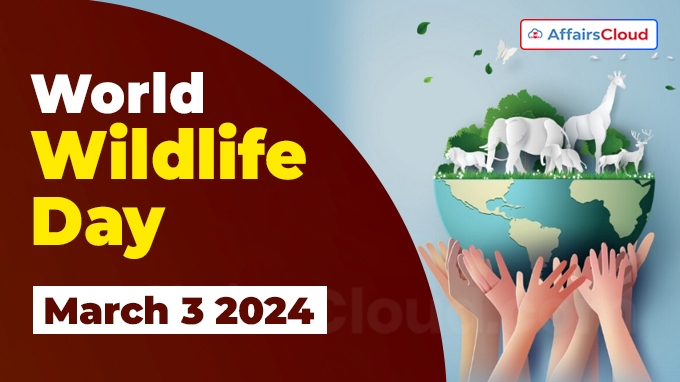 The United Nations (UN) World Wildlife Day (WWD) is annually observed across the globe on 3rd March to celebrate and raise awareness about world’s wild fauna (animals) and flora (plants). WWD serves as a global acknowledgment of the incredible diversity in our ecosystems.
The United Nations (UN) World Wildlife Day (WWD) is annually observed across the globe on 3rd March to celebrate and raise awareness about world’s wild fauna (animals) and flora (plants). WWD serves as a global acknowledgment of the incredible diversity in our ecosystems.
- WWD also highlights the benefits of the conservation of wild animals and plants and the need to accelerate efforts to fight against wildlife crime and the human-induced reduction of species.
The theme of WWD 2024 is “Connecting People and Planet: Exploring Digital Innovation in Wildlife Conservation“.
- The theme acknowledges the transformative impact of digital interventions on ecosystems and communities in an increasingly connected world.
Significance:
i.WWD 2024 explores the intersection of technology and conservation efforts.
- It emphasises the potential of digital innovations to drive sustainable wildlife practices and enhance human-wildlife coexistence.
ii.The 2024 celebration serves as a platform for intergenerational exchange and youth empowerment through art, presentations, and conversations.
- It fosters an inclusive environment for exploring opportunities in sustainable digital wildlife conservation.
Background:
i.On 20 December 2013, the UN General Assembly (UNGA) at its 68th session, proclaimed 3 March of every year as UN World Wildlife Day.
ii.The UNGA resolution designated the Convention on International Trade in Endangered Species of Wild Fauna and Flora (CITES) Secretariat as the facilitator for the global observance.
iii.Previously, 3 March was designated as World Wildlife Day in a resolution made at the 16th meeting of the Conference of the Parties to CITES (CoP16) held in Bangkok (Thailand) from 3 to 14 March 2013.
- The CITES resolution was sponsored by the Kingdom of Thailand, the Host of CITES CoP16, which transmitted the outcomes of CITES CoP16 to UNGA.
iv.The 1st ever WWD was observed on 3 March 2014.
Note: The Secretariat of CITES in collaboration with other relevant UN organisations, facilitates the implementation of WWD.
Why 3 March?
3 March marks the day of the adoption of CITES in 1973, which plays a crucial role in ensuring that international trade does not threaten the species’ survival.
- CITES remains one of the world’s most powerful tools for biodiversity conservation through the regulation of trade in wild fauna and flora.
About CITES:
i.CITES is an international agreement between governments, which aims to ensure that international trade in specimens of wild animals and plants does not threaten the survival of the species.
ii.CITES was drafted as a result of a resolution adopted in 1963 at an International Union for Conservation of Nature (IUCN) meeting.
iii.CITES text was finalised on 3 March 1973 at a meeting of representatives of 80 countries in Washington, D.C., United States of America (USA), and CITES entered into force on 1 July 1975.
Tech Advancements in Wildlife Conservation:
i.Advancements in technology, from communication tools to DNA analysis, have revolutionised wildlife conservation.
- Research, tracking, and analysis benefit from cutting-edge digital tools.
ii.Despite these strides, challenges such as uneven access, environmental pollution, and unsustainable technology use hinder the achievement of universal digital inclusion by 2030.
iii.In 2024, the CITES Secretariat collaborated with the UN Development Programme (UNDP), WILDLABS, Jackson Wild, and the International Fund for Animal Welfare (IFAW) to promote discussions and expertise for a more comprehensive approach to digital conservation.
2024 Events:
i.On the occasion of WWD 2024, a high-level event was held on 4 March 2024 at UN Headquarters in New York, USA.
ii.CITES, the Geneva Environment Network, and the International Telecommunication Union (ITU) jointly hosted an event to mark the WWD 2024 in Geneva, Switzerland.
Events in India:
As a part of WWD 2024 celebration, the World Wide Fund for Nature (WWF) Environmental Information, Awareness, Capacity Building and Livelihood Programme, Programme Centres and Resource Partners (EIACP PC-RP) organised various events at Okhla Bird Sanctuary (OBS), in Gautam Buddha Nagar, Uttar Pradesh (UP).
- The event witnessed the participation of approximately 150 people.
- WWF EIACP PC-RP is under the Ministry of Environment, Forest and Climate Change (MoEFCC).
Key People: Pramod Kumar Divisional Forest Officer, Gautam Buddha Nagar, UP was the chief guest for the event; and Amit Gupta, Range Forest Officer, Okhla Bird Sanctuary was the Guest of Honour.
About Convention on International Trade in Endangered Species of Wild Fauna and Flora (CITES):
Secretary-General– Ms Ivonne Higuero
Headquarters– Genève, Switzerland




